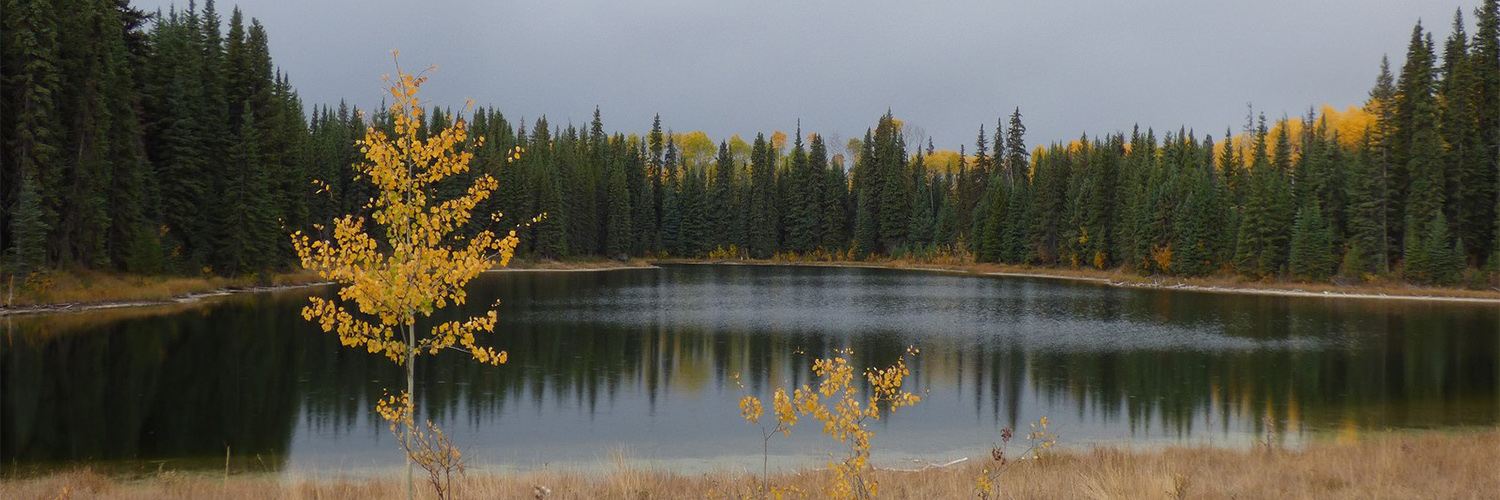Overview
'Gathering Ceremony', the launch of Silent Genomes, was held in Victoria, BC on July 18th-19th, 2018. The purpose of this gathering was to bring together the Silent Genomes project team, the First Nations, Inuit, and Métis partners, and other stakeholders. Most importantly the goal was to gather insights and feedback on the project's most crucial and comprehensive activity, Activity 1- Community Engagement, Governance and Policy Development.
There were 61 participants (57 in-person, 4 online via Skype). There was representation from national and provincial Indigenous-run organizations, First Nation Alliance communities across Canada, and national and international academic institutions
The Gathering brought together participants with a diverse range of expertise including governance, capacity building, community engagement, genetics and genomics on both a national and international level. The lead or co-lead presented on each activity which gave participants a chance to meet all members of the Silent Genomes team. There were also opportunities for participants to engage with other Indigenous researchers, community members and partners. Ensuring space for two-way communication, open-dialogues, and continuous conversations was important for the Gathering and will be maintained throughout the course of the project.
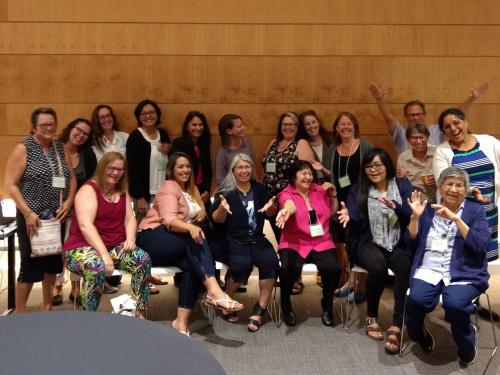 |
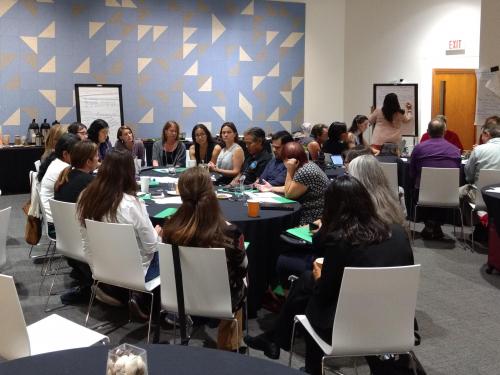 |
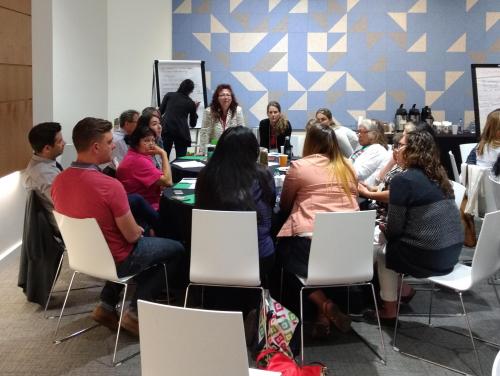 |
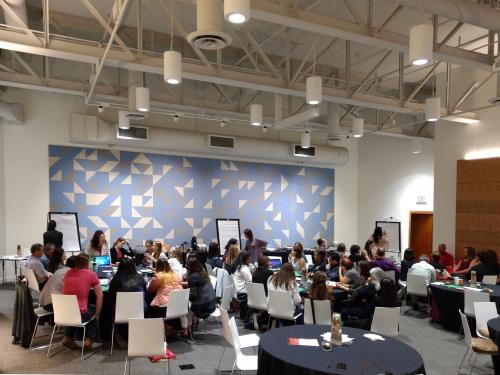 |
Presentations
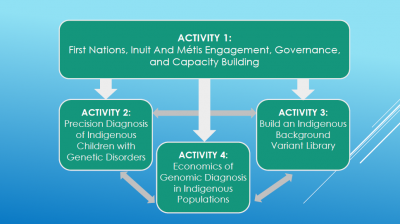 Activity 1: Integrating Indigenous-led governance, community engagement, community education, and student capacity building across all activities (Dr. Arbour and Dr. Caron)
Activity 1: Integrating Indigenous-led governance, community engagement, community education, and student capacity building across all activities (Dr. Arbour and Dr. Caron)
Activity 2: Precision genomic diagnosis of children with genetic disease (Dr. Lehman and Dr. Tarailo-Graovac)
Activity 3: Development of an Indigenous Background Variant Library (Dr. Wasserman)
Activity 4: Economics of precision diagnosis for Indigenous children (Dr. Regier)
International Indigenous Perspectives on Genomics - IIGAC - International Indigenous Genetics Advisory Committee
The IIGAC International panel included Indigenous scholars from Canada, the United States, Hawaii, Australia and New Zealand. The IIGAC members discussed Indigenous genetic/genomic initiatives within their own regions and their ways of addressing health disparities in an effort to close the gap, both in research and genetic health care.
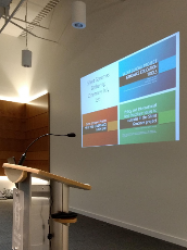 Breakout Discussions: There were three breakout groups centered on education materials, governance, and policy where participants were able to provide advice and input. Participants chose which group they would be able to provide the best guidance based on their expertise. All groups had a diverse range of perspectives from community members, Indigenous leaders, researchers, and academics.
Breakout Discussions: There were three breakout groups centered on education materials, governance, and policy where participants were able to provide advice and input. Participants chose which group they would be able to provide the best guidance based on their expertise. All groups had a diverse range of perspectives from community members, Indigenous leaders, researchers, and academics.
Related Materials
Gathering Ceremony Program and Report
Principles and guidelines on Indigenous Peoples rights
Existing principles and guidelines that address Indigenous Peoples rights to self-determination, access, gaps, on-going community input, and research and ethics were brought up that will build a solid foundation for the standards for Governance and guidance in Policy. Inclusion of these guidelines/statements were considered non-negotiable when building the Governance for Silent Genomes.
- United Nations Declaration of the Rights of Indigenous Peoples (UNDRIP)
- Truth and Reconciliation Commission (TRC)
- Ownership, Control, Access, and Possession (OCAP)
- Tri-council Policy Statement (TCPS)- Chapter 9
Canadian and international research policies and Indigenous oversight perspectives:
Canada
- CIHR Guidelines for Health Research Involving Aboriginal People (2007-2010)
- DNA on loan: issues to consider when carrying out genetic research with aboriginal families and communities. Arbour L, Cook D. Community Genet. 2006;9(3):153-60.
US - Hawaii
- A Comparative Analysis of Indigenous Research Guidelines to Inform Genomic Research in Indigenous Communities. Nicole K. Taniguchi, Maile Taualii, Jay Maddock, Native Hawaiian Epidemiology Center, Papa Ola Lokahi University of Hawaii, Office of Public Health Studies
- Native Hawaiian views on biobanking. Taualii M, Davis EL, Braun KL, Tsark JU, Brown N, Hudson M, Burke W. J Cancer Educ. 2014 Sep;29(3):570-6. doi: 10.1007/s13187-014-0638-6.
US - Alaska
- A culturally-tailored behavioral intervention trial for alcohol use disorders in three American Indian communities: Rationale, design, and methods. McDonell MG, Nepom JR, Leickly E, Suchy-Dicey A, Hirchak K, Echo-Hawk A, Schwartz SM, Calhoun D, Donovan D, Roll J, Ries R, Buchwald D. Contemp Clin Trials. 2016 Mar;47:93-100
- Self-Determination in Health Research: An Alaska Native Example of Tribal Ownership and Research Regulation
New Zealand
- Guidelines for Biobanking with Māori Tissue. Hudson M, Beaton A, Milne M, Port W, Russell K, Smith B, Toki V, Uerata L, Wilcox P: He Tangata Kei Tua
- Engaging Maori in biobanking and genomic research: a model for biobanks to guide culturally informed governance, operational, and community engagement activities. Genetics in medicine : official journal of the American College of Medical Genetics 2017, 19:345-351 Beaton A, Hudson M, Milne M, Port RV, Russell K, Smith B, Toki V, Uerata L, Wilcox P, Bartholomew K, Wihongi H
Australia
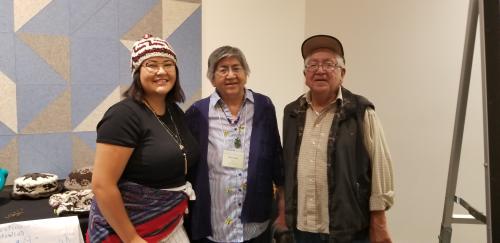 |
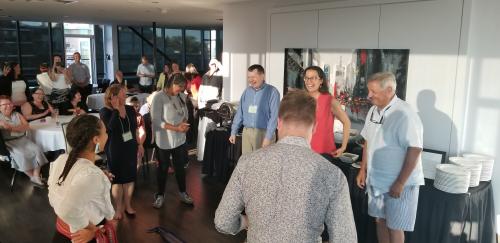 |
Territory Acknowledgement
We acknowledge and respect the traditional territory of the Lekwungen-speaking Peoples on whose traditional territories the Gathering Ceremony Conference was located on and the Songhees, Esquimalt and WSÁNEĆ peoples whose historical relationships with the land continue to this day.
We acknowledge our Elders who were in attendance, Elder May and Skip Sam and raise our hands to them for opening our conference in a cultural way and creating a safe space for our discussions. We are grateful to have witnessed the Lekwungen traditional dancers and Métis Jiggers and thankful to the diverse group of participants who were representing their Indigenous community and/or organization across Canada.
